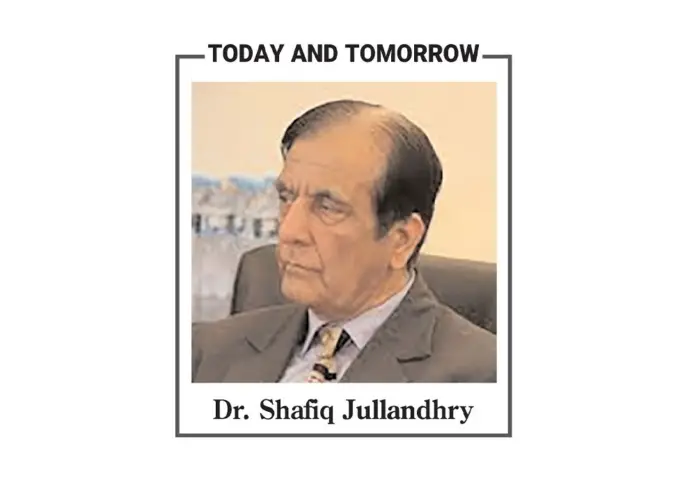Speaking this week in Eilaf Clun, on the topic of “Political Changes and Economic Status of Pakistan”, veteran journalist Nasim Ahmed said that he would like to call it a “Political Catastrophe” and that describes the present situation better. He said that since the tragedy of 1971, we haven’t faced any dangerous situation like this. We are facing the utmost uncertainty in our national history. On the one hand, the enemy is fanning the racial and linguistic conflicts in different parts of the country, and on the other hand, the weakest governments are working at the provincial and federal levels. There is the Ukraine war and the COVID epidemic effects that have disturbed the world economies. Our economy is also being disturbed by the political disaster. Our rupee’s value has fallen 40% within these three months. We are experiencing a political and economic meltdown. Besides this, the State Bank has raised the interest rate to 15%. That is perhaps the highest in the world. The industry will not be in a position to work with this interest rate. Hundreds of factories have already been closed. Heavy layoffs will exacerbate the difficulties of the lower classes. There is a continuous increase in inflation.
We are facing open and covered pressure from the IMF. The nation knows nothing about the conditions of the IMF that have been signed by our government. The most important issue is that food prices are rising at an unsustainable rate for the lower and middle classes. The sword of food insecurity is also hanging on our heads. No one knows where this flood will stop. Are we going to become like Sri Lanka? The way the turncoats’ government was imposed on us on April 9, was miserable. Then a drama started in Punjab about grabbing the government. The position is also distorted by the flatterers, who are loyal to the Emperor more than the Emperor himself. We see, that Imran Khan’s confidence level is very high after winning the 15 seats in the by-pass elections. If Hamza’s government is ousted, the federal government of Shehbaz Sharif will also be toppled. Early elections are the only solution for our country. If the elections are rigged, Imran Khan will not sit idly. Then we will be encircled by the worst political crisis. If there is no interruption from the establishment in elections and neat and clean elections are allowed, then political stability will bring economic stability also.
Rana Ameer Ahmed Khan, Advocate Supreme Court, deplored that foreign loans were maximised by the Nawaz Sharif and Benazir regimes and were utilised inefficiently. In particular, unfavourable contracts were made with IPPs for purchasing electricity at the highest rate in the world. We didn’t make Kalabagh Dam and ignored the cheaper production of hydel electricity. Zardari and Sharifs had been competing to plunder the country. There must be planning according to the new needs of the national economy and population. There is neither an increase in the GDP nor any control over the fast-increasing population. Neither is there a will to stop corruption nor any desire to develop our human resources and make transparent use of our limitless mineral and agricultural resources. There was a time when twenty judges were appointed without any merit. We launched a movement against it from the bar side. The international establishment’s game is being played in our country. India has purchased Haifa’s port from Israel. Those Islamic countries that have been detached from us and helped us in developing our nuclear program.
Khalifa Ziauddin thought that we should try to see a ray of hope in this darkness of disappointment. There is a cure for our ailment. We are still very important in our geopolitical position. Hindus of the sub-continent accepted the partition of India on a Muslim and non-Muslim basis because they wanted to divide us in this sub-continent. They wanted their defence also, by creating a buffer state between them and the central Asian states, the traditional raiders of the sub-continent. If Pakistan is unstable, it will be harmful to India also. Chaos in a country of a quarter billion people can have devastating effects on the peace of the whole world. The good thing about us is that we still stand by the Islamic ideology for which we demanded a separate homeland. On the other hand, India has shifted from its secular posture to extremist Hinduism. We are also in the midst of a world-wide crisis. Ukraine’s war has brought the whole of Europe and the USA together in war with Russia. When there is a game of devastation all around you, there is a need to be very careful.
Majeed Ghani contended that Pakistan’s role in the Middle East is crucial and our importance in the region can’t be decreased. He stressed the importance of free and quality compulsory education for all. Touqir Khan said that Pakistan’s leadership, including Imran Khan, must keep these global realities in mind for the national interest. Nasim Ahmed said we need to break the status quo to march ahead. Imran Khan had broken the status quo, but he was not allowed to complete his full tenure of five years. Nevertheless, he had shattered the dreams of those who wanted their family’s dynasties in this country on the strength of their corruption. Some people also believe in the theory of chaos for change. Azeem Ashraf questioned that if Imran Khan is so good as a political leader, why did he provide a chance to the allied opposition to oust him? What can we do better for our country in this crisis? Nasim Ahmed reiterated that change organisations and intellectuals in the country should come forward and break the status quo. Let the new people come forward with zeal and capability to change the fate of the nation.







